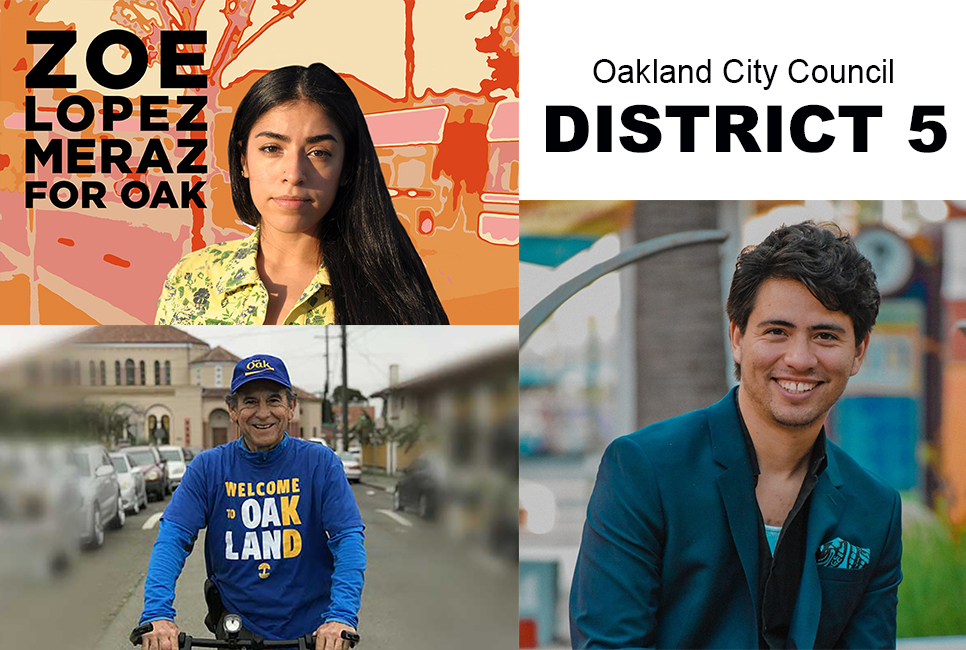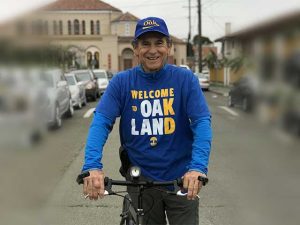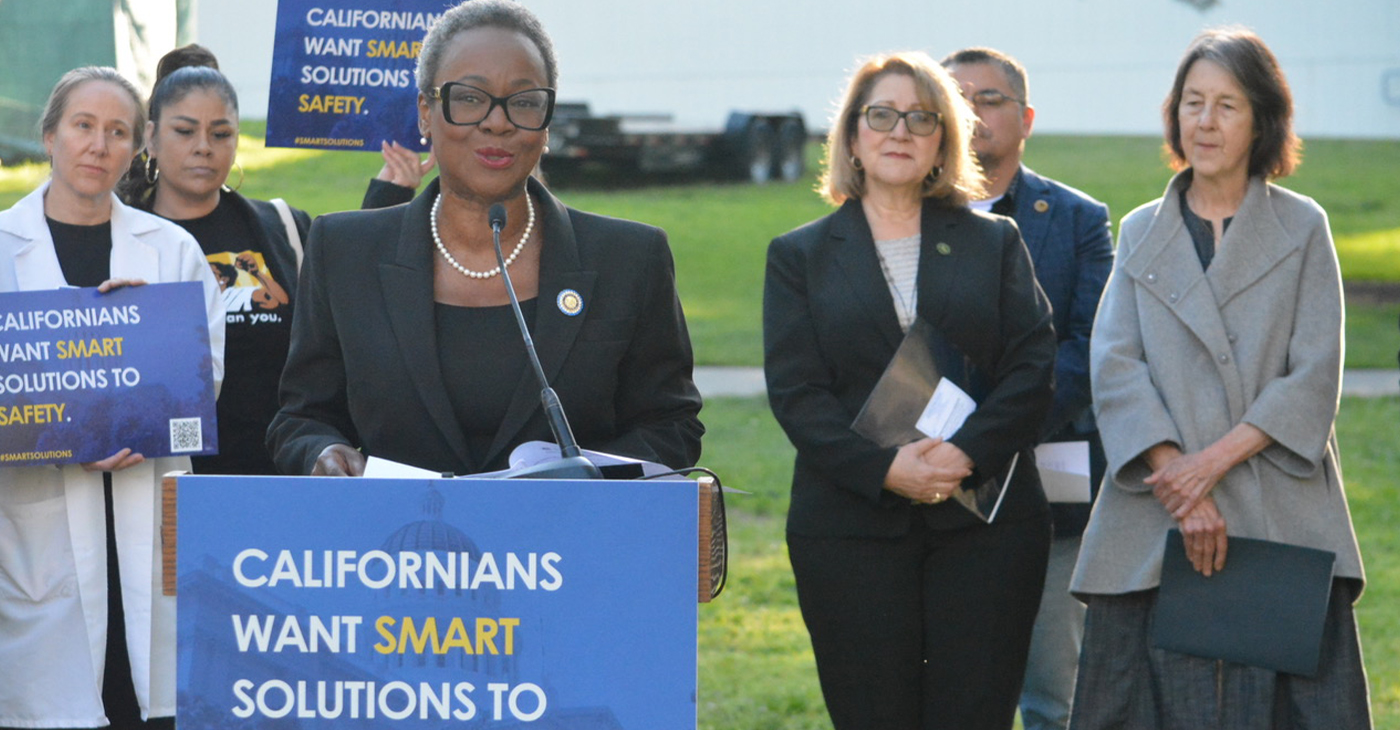Government
Candidates For Oakland’s District 5 Share Their Platforms

Incumbent Noel Gallo
 East Oakland native and District 5 incumbent Noel Gallo touts his Oakland public education with pride. He’s been holding his city council position since 2013 and before that, he served 20 years as a member of the Oakland Board of Education.
East Oakland native and District 5 incumbent Noel Gallo touts his Oakland public education with pride. He’s been holding his city council position since 2013 and before that, he served 20 years as a member of the Oakland Board of Education.
In his time on the City Council, Gallo helped create the Police Commission and is committed to reducing the police department budget by 50%. He says he is committed to reimagining public safety and believes in providing a model of counseling for youth that is from the school level to street level as a form of violence prevention.
Gallo supports affordable housing, currently working with the Unity Council to continue Phase 2 development for housing in transit areas that includes 30 units of housing for the homeless. He has helped the Native American Health Center develop 110 units on International Boulevard next to the health center. He is also working with the Agnes Memorial Church to create senior housing.
Gallo is open to negotiating the leasing of the Coliseum land that is publicly owned in order to maintain control of how it is used by the city, rather than sell it or sell the Oakland Port to private entities.
To learn more about Noel Gallo’s campaign go to https://www.noelgalloforoakland.com/
Zoe Lopez-Meraz
 Zoe Lopez-Meraz has worked in the medical fields of physical therapy, transplant, and urology and volunteers at the Berkeley Free Clinics. She puts a high value on supporting teachers and education. She wants to decriminalize homelessness, sex work, and drugs as she says on her website all three disproportionately affect people of color and create a revolving door of criminalization.
Zoe Lopez-Meraz has worked in the medical fields of physical therapy, transplant, and urology and volunteers at the Berkeley Free Clinics. She puts a high value on supporting teachers and education. She wants to decriminalize homelessness, sex work, and drugs as she says on her website all three disproportionately affect people of color and create a revolving door of criminalization.
Since 80% of calls to OPD are non-violent, Lopez-Meraz says reinvesting into the community from the money saved in the 50% decrease in OPD’s budget would make sense. She sees a great need for addressing mental health in the community so that police are not the first responders to mental health crises.
On sheltering and housing issues, Lopez-Meraz holds a straight-forward stance. If it’s vacant, take the property, repurpose vacant lots, warehouses, empty hotel rooms and vacant units using state emergency funding that is already available. She said the city creates policies with no real plan for execution.
Lopez-Meraz does not support the project proposed to build 3,000 units of high-end housing and a ballpark on the Oakland Port property. She thinks more support should be placed in existing infrastructure and more should be done to boost business in East Oakland.
To learn more about Zoe Lopez-Meraz’s campaign go to https://www.zlm4oak.org/
Richard Santos Raya
 Long-time Bay Area resident Richard Santos Raya has a background as a classroom educator and lawyer. He says he wants to connect with those who are looking to work on labor, racial, housing, and economic justice.
Long-time Bay Area resident Richard Santos Raya has a background as a classroom educator and lawyer. He says he wants to connect with those who are looking to work on labor, racial, housing, and economic justice.
Regarding OPD, Raya says one of the first things that can be done is to curb police spending and police injustice is to address rampant overtime funding. A huge drain on city coffers, it also incentivizes police to make arrests near the end of their shift in order to rack up overtime pay. He also says malpractice or brutality cases should not be paid out of taxpayer money, instead possibly from the police pension fund.
On homelessness, Raya says that in addition to the construction that has already been undertaken and Tuff sheds, he believes Oakland needs to convert existing housing to deeply affordable housing.
He says there should be a partnership with local land trusts and recommends removing housing from the unstable, untenable rental market into a more sustainable holding pattern. Small landlords need incentives to maintain their housing at below affordable rates.
Raya does not support a new ballpark at the Oakland Port. He wants to keep the public land at Oakland Coliseum and says it’s important to retain the Oakland A’s at that site.
To learn more about Richard Raya Santos’ campaign go to https://www.santosraya.com/
City Government
LAO Releases Report on Racial and Ethnic Disparities in California Child Welfare System
Racial inequalities in California’s child welfare system disproportionately impact poor Black and Native American children, according to a report released April 3 by the nonpartisan Legislative Analyst’s Office (LAO). The report, which was presented to the Assembly Subcommittee No. 2 on Human Services — chaired by Assemblymember Corey Jackson (D-Moreno Valley) — states that the proportion of low-income Black and Native American children in foster care is four times larger than other racial and ethnic groups in the state.

Racial inequalities in California’s child welfare system disproportionately impact poor Black and Native American children, according to a report released April 3 by the nonpartisan Legislative Analyst’s Office (LAO).
The report, which was presented to the Assembly Subcommittee No. 2 on Human Services — chaired by Assemblymember Corey Jackson (D-Moreno Valley) — states that the proportion of low-income Black and Native American children in foster care is four times larger than other racial and ethnic groups in the state. Half of the children from each racial group has experienced some level of child welfare involvement before reaching legal age.
Jackson is a member of the California Legislative Black Caucus.
“Racial and ethnic disproportionality and disparities are present within initial allegations and persist at all levels of the system — becoming the most pronounced for youth in care,” the report states.
The disparities have persisted over the last decade across the state, the LAO found, adding that Black children living in poverty are more likely to enter foster care. State data shows that there is a correlation between poverty and foster placement in each county.
“Throughout all levels of the child welfare system, families experiencing poverty are more likely to come to the attention of and be impacted by the child welfare system,” stated the report.
Overall, the report revealed that more than half of the families affected by the state child welfare system earn $1,000 per month, significantly less than the national average of $5,000 a month.
The financial disparities highlighted in the LAO report align with existing research indicating that poverty is among the main factors contributing to the likelihood of child maltreatment. State anti-poverty programs include cash aid, childcare subsidies, supportive housing, and nutrition assistance.
California Black Media
Commentary: Finding the Right Balance — Addressing Organized Retail Theft While Upholding Civil Liberties
Organized retail theft is a significant issue that impacts both consumers and businesses. While it is crucial to address theft and protect businesses from losses, we should also be mindful of safeguarding individuals’ constitutional rights, particularly the right to due process. AB 1990 by Assemblymember Wendy Carrillo, also known as the STOP Act, raises concerns about the balance between addressing theft effectively and ensuring civil liberties are upheld.

By Assemblymember Tina McKinnor | Special to California Black Media Partners
Organized retail theft is a significant issue that impacts both consumers and businesses. While it is crucial to address theft and protect businesses from losses, we should also be mindful of safeguarding individuals’ constitutional rights, particularly the right to due process.
AB 1990 by Assemblymember Wendy Carrillo, also known as the STOP Act, raises concerns about the balance between addressing theft effectively and ensuring civil liberties are upheld. This bill allows law enforcement officers to make warrantless arrests for shoplifting offenses not witnessed by the officer, as long as there is reasonable cause to believe the individual committed the crime. This bill has a dangerous potential for overreach and infringes on civil liberties, particularly the right to due process.
While the stated intention behind the STOP Act is to combat organized retail theft and protect businesses, there are valid concerns that this bill is an overreach and that existing law works, if properly enforced by our partners in law enforcement. A petty theft involving property stolen valued at $950 or less may be charged as a felony or misdemeanor (called a wobbler) if the offender has the following prior convictions: 1) at least on prior petty or theft-related conviction for which a term of imprisonment was served, and 2) a prior conviction for a serious or violent offense, for any registerable sex offense, or for embezzlement from a dependent adult or anyone over the age of 65. A misdemeanor can result in a sentence of up to one year in jail, whereas a felon can mean incarceration for 16 months, two years or three years. Let’s look at shoplifting in California. It occurs when a suspect enters a store, while that establishment is open, intending to steal property worth less than $950. The crime is considered a misdemeanor, punishable by up to six months in the county jail.
Granting officers the authority to arrest individuals based on reasonable cause, without witnessing the crime firsthand, can lead to negative consequences and possible violations of individual rights. Probable cause is the legal standard by which police authorities have reason to obtain a warrant for the arrest of a suspected criminal and for the courts to issue a search warrant. A grand jury uses the probable cause standard to determine whether or not to issue a criminal indictment. The principle behind the probable cause standard is to limit the power of authorities to conduct unlawful search and seizure of a person or its property, and to promote formal, forensic procedures for gathering lawful evidence for the prosecution of the arrested criminal. Reasonable cause does not require any of this due process and only requires that an officer reasonably believes that a crime has been committed. It is essential to find a middle ground that effectively addresses organized retail theft without compromising the fundamental rights of individuals.
California’s current laws, including the use of witness statements and surveillance evidence are sufficient for addressing suspected shoplifting and organized retail theft. California Attorney General Rob Bonta recently prosecuted Michelle Mack, a suspected organized smash and grab ringleader who paid twelve women to travel around California and commit over $8 million in retail theft at 21 different stores. AG Bonta used California’s current laws to have the suspect arrested and brought to justice.
The State of California is also making significant investments to address retail theft. Just this past year California invested an additional $267 million to combat organized retail theft. It has been less than a year and our law enforcement partners should have the opportunity to address this recent spike in retail theft crime.
Los Angeles County recently applied for and received a grant for the State of California for $15.6 million dollars to address retail theft enforcement. LA District Attorney George Gascon also recently formed an organized retail task force that partners with LA County Sheriff’s Department, Glendale, Beverly Hills, Burbank, Torrance and Santa Monica Police Departments to integrate their response to retail theft across the region. These collaborative efforts, such as those seen in initiatives like the organized retail task force in LA County, demonstrate the importance of a united approach to tackling theft while maintaining a balance between enforcement and civil liberties.
As we move forward, it is essential for policymakers, law enforcement agencies, businesses and communities to work together in finding solutions that effectively address organized retail theft without encroaching on individual rights. Ongoing evaluation and a commitment to thoughtful consideration will be crucial in navigating this challenge and fostering a safe and prosperous environment for all. Balancing the scales of justice to protect businesses while upholding civil liberties demands a comprehensive and conscientious approach from all stakeholders involved.
I am confident we can find that balance.
About the Author
Assemblymember Tina McKinnor (D-Inglewood) represents the 61st District in Los Angeles County, which includes parts of the South Bay, Inglewood, Hawthorne and Lawndale.
Antonio Ray Harvey
Sacramento Lawmakers Step Up Push for “Smart Solutions” on Crime, Public Safety
Assemblymember Tina McKinnor (D-Inglewood) and Sen. Lola Smallwood-Cuevas (D-Ladera Heights), both members of the California Legislative Black Caucus (CLBC), have joined other lawmakers and criminal justice reform advocates to address public safety in the state. On April 2, CLBC members gathered outside the State Capitol for the unveiling of the #SmartSolutions Public Safety Policy Platform, a package of 30 bills that addresses the top concerns of retailers, retail workers, the fentanyl crisis, and support for victims and survivors of crime.

By Antonio Ray Harvey, California Black Media
Assemblymember Tina McKinnor (D-Inglewood) and Sen. Lola Smallwood-Cuevas (D-Ladera Heights), both members of the California Legislative Black Caucus (CLBC), have joined other lawmakers and criminal justice reform advocates to address public safety in the state.
On April 2, CLBC members gathered outside the State Capitol for the unveiling of the #SmartSolutions Public Safety Policy Platform, a package of 30 bills that addresses the top concerns of retailers, retail workers, the fentanyl crisis, and support for victims and survivors of crime.
“Instead of being tough on crime, we need to be smart on crime,” Smallwood said at the press briefing. “I am not saying that we’re not going to be holding folks accountable for the actions that they take. But we will not rely on incarceration as a solution.”
McKinnor, Smallwood-Cuevas, a coalition of advocates, addiction treatment experts, and Yurok Tribal leaders joined Sen. Nancy Skinner (D-Berkeley), and Assemblymember Eloise Gómez Reyes (D-Colton) at the press conference organized to promote legislative solutions that ensure safety and justice.
Organizers say #SmartSolutions is an intersectional campaign that combats criminalization and mass incarceration by pushing for the redirection of state resources to fund housing, health care, schools, services for victims, and programs that reduce recidivism and promote accountability, beyond incarceration.
Opponents of the bills proposed in the #SmartSolutions campaign say their colleagues who support reform-focused strategies are looking the other way on crime and encouraging lawlessness.
For example, Assemblymembers Wendy Carillo (D-Boyle Heights), Carlos Villapudua (D-Stockton) and Mike Gipson (D-Carson) are supporting Assembly Bill (AB) 1990, legislation that would allow a peace officer to arrest shoplifters without a warrant or without witnessing the theft.
Assemblymember James Ramos (D-Highland) authored AB 1772 and introduced it in January. The legislation proposes sterner penalties for retail theft, particularly for repeat offenders.
The #SmartSolutions campaign is co-sponsored by Ella Baker Center for Human Rights, Smart Justice California, American Civil Liberties Union (ACLU) California Action, Californians for Safety and Justice, and Californians United for a Responsible Budget (CURB).
Smallwood recently introduced two bills she hopes will provide solutions to the escalating retail theft problem in the state. Senate Bill (SB) 1446 addresses theft, technology and job security in retail establishments and aims to minimize workplace violence, according to supporters. SB 1282 requires counties to expand the use of a diversion program for theft cases.
“Restorative Justice is the essential pillar of making our criminal justice system more fair, just, and equitable,” McKinnor said. “Restorative justice recognizes the trauma of victims and preparatory of crimes and provides a constructive space for victims to find healing.”
Dr. Amiee Moulin, founder of the California Bridge program and chief of the Division of Addiction Medicine at the University of California (UC) Medical Center, said drug “addiction and overdose” are taking a toll on patients, families and the community.
“I believe that California’s proposed legislation focused on expanding access to treatment is a crucial step towards saving lives,” Moulin said. “By removing barriers to care and embracing evidenced-based strategies we can provide patients the support they need to heal and recover.”
-

 Activism4 weeks ago
Activism4 weeks agoOakland Post: Week of March 20 – 26, 2024
-

 #NNPA BlackPress3 weeks ago
#NNPA BlackPress3 weeks agoCOMMENTARY: D.C. Crime Bill Fails to Address Root Causes of Violence and Incarceration
-

 #NNPA BlackPress3 weeks ago
#NNPA BlackPress3 weeks agoMayor, City Council President React to May 31 Closing of Birmingham-Southern College
-

 #NNPA BlackPress3 weeks ago
#NNPA BlackPress3 weeks agoFrom Raids to Revelations: The Dark Turn in Sean ‘Diddy’ Combs’ Saga
-

 #NNPA BlackPress3 weeks ago
#NNPA BlackPress3 weeks agoCOMMENTARY: Lady Day and The Lights!
-

 #NNPA BlackPress3 weeks ago
#NNPA BlackPress3 weeks agoBaltimore Key Bridge Catastrophe: A City’s Heartbreak and a Nation’s Alarm
-

 #NNPA BlackPress3 weeks ago
#NNPA BlackPress3 weeks agoBaltimore’s Key Bridge Struck by Ship, Collapses into Water
-

 Activism3 weeks ago
Activism3 weeks agoOakland Post: Week of March 27 – April 2, 2024




















































